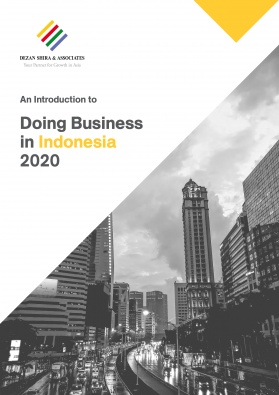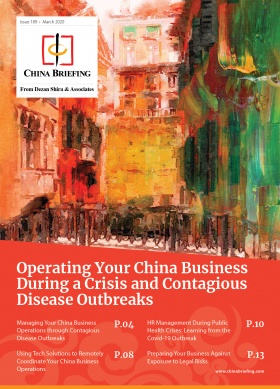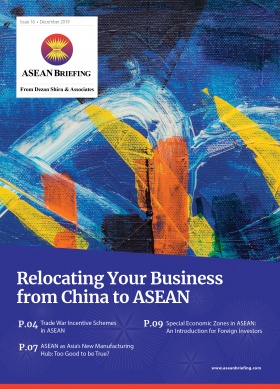Malaysia Issues Second Stimulus Package to Combat COVID-19: Salient Features
- On March 27, 2020, the Malaysian government issued its second stimulus package to combat the economic impact of the COVID-19 pandemic.
- The second package, valued at 250 billion ringgit (US$57 billion), enhances the existing financing facilities issued in the first stimulus package.
- It also aims to support businesses, especially small and medium-sized enterprises (SMEs), assist low and middle-income households, and provide fiscal injections to strengthen the national economy.
- The government will also provide free internet during the lockdown period as well as improve the country’s telecommunication network.
On March 27, 2020, the Malaysian government issued its second stimulus package to combat the economic impact of the COVID-19 pandemic.
The second package, valued at 250 billion ringgit (US$57 billion), focused on enhancing the existing financing facilities issued in the first stimulus package. It also aims to support businesses, especially for small and medium-sized enterprises (SMEs), assist low and middle-income households, and provide fiscal injections to strengthen the national economy.
The first stimulus package was valued at US$4.8 billion and aimed to counter the immediate impact of the outbreak on the country’s most vulnerable sectors and households.
Estimated to be valued at 17 percent of the GDP, the second stimulus package is expected to widen the budget deficit to four percent. Malaysia has also been reeling from the sudden drop in global oil prices, which provides for some two-thirds of government revenue. The central bank, Bank Negara Malaysia has predicted GDP growth at between -2 percent to 0.5 percent in 2020.Investors should seek the assistance of registered tax advisors to better understand how they can benefit from these relief measures.
Increased support for businesses
The government has made available an additional 4.5 billion ringgit (US$1 billion) in additional funds to assist SMEs.
Special relief fund
Three billion ringgit (US$688 million) has been allocated to help SMEs in the form of low-interest loans through the Special Relief Fund (SRF).
The first stimulus package provided two billion ringgit (US$453 million) towards the SRF scheme with the interest rate capped at 3.75 percent per annum. The interest rate is reduced to 3.5 percent. Each eligible SME can receive between 20,000 ringgit (US$4,500) and 1 million ringgit (US$226,000) with a tenure of 5.5 years – this includes a 6-months payment moratorium.
All economic sectors facility
One billion ringgit (US$229 million) is allocated for the All Economic Sectors (AES) facility. The AES program provides financing for SMEs that can be used for working capital to support growth or for capital expenditures. The interest rate is set at seven percent per annum with a tenure of five years. Qualified SMEs can receive up to 5 million ringgit (US$1.1 million).
After this addition, the AES program has now accumulated 6.8 billion ringgit (US$1.5 billion) to help SMEs.
Micro-credit scheme
The remaining 500 million ringgit (US$114 million) has been added to the micro-credit scheme. Aimed for micro-enterprises, the scheme allows small businesses to receive a loan of up to 75,000 ringgit (US$17,000) with the interest rate set at two percent.
Credit guarantee corporation program
The credit guarantee corporation program (CGC) encompasses the BizMula-i and BizWanita-i schemes. These schemes help SMEs with business records of less than four years with financing worth up to 300,000 ringgit (US$68,000).
Increasing financing for Syarikat Jaminan Pembiayaan Perniagaan
The Syarikat Jaminan Pembiayaan Perniagaan (SJPP) is a company established in 2009 by the Ministry of Finance to manage two guarantee schemes (Working Capital Guarantee Scheme (WCGS) and Industry Restructuring Financing Guarantee Scheme (IRFGS) to help SMEs gain access to financing from financial institutions.
Through these schemes, the government will provide a guarantee of up to 70 percent for any loans approved to eligible SMEs. This has now been increased to 80 percent in the second COVID-19 stimulus package.
Assisting business cashflow
To assist businesses in managing their cashflow during these uncertain times, the government has provided several options for loan deferments and tax deductions.
Deferment of income tax and loan repayments
The government has allowed some 750,000 SMEs to postpone the payment of income tax for three months beginning April 1, 2020. In the previous stimulus package, businesses in the tourism sector were allowed to postpone income tax payments for six months, also beginning from April 1, 2020.
The latest package also enables banking institutions to provide six months deferral or loan repayment moratorium, conversion of credit card balance to long-term loans, and the restructuring of corporate loans
Guarantees for corporate entities
In addition to assisting SMEs, the corporate sector will be provided a 50 billion ringgit (US$11.4 billion) guarantee scheme through which each business can receive up to 20 million ringgit (US$4.5 million).
Businesses can apply from May 31 to December 31, 2020.
Human Resources Development Fund
Companies will be exempt from paying the Human Resources Development Fund (HRDF) for six months for all sectors, starting April 1, 2020. The HRDF is a training fund established for skills development and retraining of employees. Businesses pay a levy towards this fund, which is based on each company’s annual turnover.
Through the exemption, the government hopes this will provide savings estimated at 440 million ringgit (US$100 million).
Strengthening the economy
As part of its efforts to stabilize the economy in the medium-term, the government will inject 25 billion ringgit (US$5.7 billion) into the economy. Furthermore, two billion ringgit (US$457 million) is allocated for domestic, small-scale infrastructure projects.
These include repairing roads, upgrading schools in the regions of Sabah and Sarawak, as well as improving tourism facilities. The government hopes these initiatives will help local G1-G4 construction companies.
Construction companies are graded into seven specific registration grades in Malaysia. Contractors are not allowed to undertake projects that exceed the value specified in their registration grade.
- G1 – not exceeding 200,000 ringgit (US$45,000);
- G2 – not exceeding 500,000 ringgit (US$114,000);
- G3 – not exceeding 1 million ringgit (US$229,000);
- G4 – not exceeding 3 million ringgit (US$686,000);
- G5 – not exceeding 5 million ringgit (US$1.1 million);
- G6 – not exceeding 10 million ringgit (US$2.2 million); and
- G7 – no limit.
G1-G4 construction companies are considered small-grade contractors.
Budget saving measures
The Prime Minister has asked ministries to look for possible savings within their individual budgets that can be used to assist in curbing the outbreak. Moreover, two-months salary will be deducted for the Prime Minister and Cabinet Ministers, which will be channeled to the COVID-19 fund.
Curbing the outbreak
A significant portion of the stimulus package is aimed at protecting the people through subsidies and cash handouts.
Extra support to fight COVID-19
An extra 500 million ringgit (US$114 million) has been allocated in the stimulus package to purchase medical equipment, such as ventilators, personal protective equipment, lab equipment, and ICU equipment.
A further 1 billion ringgit (US$229 million) is allotted to purchasing medical equipment and expertise from private healthcare services. The insurance industry (which also includes the Islamic takaful insurance sector) will donate 8 million ringgit (US$1.8 million) to help conduct more COVID-19 tests for insurance and takaful policy holders.
There will also be a deferment of family insurance and takaful premiums for three months for affected individuals.
Healthcare personnel will have their special monthly allowance increased from 400 ringgit (US$91) to 600 ringgit (US$137) and a special allowance of 200 ringgit (US$45) for the military, police, civil defense, immigration, firefighters, and members of the voluntary force directly involved in implementing the lockdown.Wage subsidy
Workers earning less than 4,000 ringgit (US$916) per month will be eligible to receive 600 ringgit (US$137) per month for the next three months. The government expects this will cost 5.9 billion ringgit (US$1.3 billion).
Food security
An estimated one billion ringgit (US$230 million) is to be distributed to increase the domestic production of agriculture, fisheries, and livestock products.
Cash handouts for households
There will be cash handouts totaling 10 billion ringgit (US$2.2 billion) for B40 and M40 households. The government classifies household incomes into three categories, namely T20, M40, and B40.
The T20 group are those in the top 20 percent of earners in the country (upper class), the M40 group are the middle 40 percent of earners (middle class), and the B40 group are the bottom 40 percent of earners (lower class).
The 10 billion ringgit (US$2.2 billion) cash assistance will be distributed as follows:
- 1,600 ringgit (US$366) will be given to households with a monthly income of 4,000 ringgit (US$916) or less;
- 1,000 ringgit (US$229) will be allocated to households with a monthly income between 4,000 ringgit (US$916) and 8,000 ringgit (US$1,800);
- 800 ringgit (US$184) will be given to individuals aged 21 years and above whose monthly income is 2,000 ringgit (US$458) or below; and
- 500 ringgit (US$114) will be given to individuals aged 21 years and above whose monthly income is more than 2,000 ringgit (US$458) and below 4,000 ringgit (US$916).
More funding for Bantuan Sara Hidup
The government will disburse 3.2 billion ringgit (US$735 million) for the Bantuan Sara Hidup (BSH) program. BSH is a program that distributes financial aid to households every year.
Telecommunication services incentives
The government has pledged 600 million ringgit (US$138 million) to provide free internet from April 1, 2020, during the lockdown period. Another 400 million (US$92 million) is earmarked to expand the telecommunication network and improve quality.
About Us
ASEAN Briefing is produced by Dezan Shira & Associates. The firm assists foreign investors throughout Asia and maintains offices throughout ASEAN, including in Singapore, Hanoi, Ho Chi Minh City and Jakarta. Please contact us at asia@dezshira.com or visit our website at www.dezshira.com







